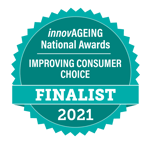We're passionate about providing aged care solutions that helps relieve stress and enable your home to track care time minutes simply and in real-time to be compliant.
Get in touch by filling in the form, we look forward to hearing from you.
Are you ready?
In response to the Aged Care Royal Commission, from October 2023 the federal government mandated that residents of aged care facilities are to receive a minimum of 200 minutes of care time per day. 40 minutes of that time must come directly from a Registered Nurse on site and there must be a Registered Nurse rostered for 16 hours per day.
Mandatory care time standards reporting is expected to start from July 2022 and has led to clinical and management teams within aged care looking for ways to calculate the level of care provided to residents day-to-day, as well as meeting reporting and statement requirements before the deadline date.
Calculating the data correctly and evidencing care to reach the benchmark of 200 minutes per resident per day will be a challenge, however, with the right solutions in place, such as a clinical care system, evidencing care will be simple, streamlined, efficient and will enable your facility to meet the new Government legislation.
A recent study analysing surveys submitted by 50% of all aged care homes in Australia found the average care time minutes being delivered is 175.8 minutes, and 84% of aged care facilities are delivering less than 200 minutes of care per resident per day. Results show the majority of aged care homes may not meet new mandatory care minute requirements and minimum staffing standards by the Government deadlines and therefore, its vital facilities are educated on the matter so they can implement the right solutions ensuring all care is evidenced efficiently and accurately.
Here's everything you need to know about evidencing care time minutes and the importance of acting on regulations now.
Care minutes is the amount of care residents within aged care homes received direct care from:
The current approach for calculating the quantity of direct care minutes considers an industry-wide average of 200 minutes of care per care recipient daily, with 40 minutes of direct care provided by a registered nurse. This is expected to raise to an industry-wide average of 215 minutes, including 44 minutes of direct care, starting from October 1, 2024.
The AN-ACC funding model supports the allocation of direct care minutes. Commencing October 1, 2024, the Australian Government will furnish additional funding to assist approved providers of residential care services in adapting to the increased requirement of 215 care minutes.
For more details regarding the funding of direct care minutes, please refer to the Care Minutes and 24/7 Registered Nurse Responsibility Guide.
The 200 minutes will include registered and enrolled nurses and personal care assistants, but it will not include allied health, lifestyle or pastoral care. There will be exemptions depending on the situation of the residential aged care facility, for example, homes that cater for homeless older people will be able to include social workers in their 200 minutes of care.
Many facilities have registered nurses in management roles and only their time spent managing the care of residents can be counted, including offering guidance on, or executing tasks related to wound care, diabetes management, behavioural support, medication management, nutritional and hydration oversight, pressure sore prevention, and incontinence care.
Administrative care management staff activities that are not direct resident care, such as staff rostering, recruitment, and facility-level planning and reporting, cannot be included in the calculation of care minutes.

With the new star rating system, if an aged care facility goes over their required care minutes time, they should expect more stars than a facility with less care time evidenced.
Accuracy of data is essential; to ensure residential aged care providers are submitting the correct care time minutes, the Department of Health will collect roster data for salary hours and will conduct cross-checks. The aged care regulator will also be provided with additional funding to include care minutes data in its quality audits.
The aged care workers and homes will be held to account for the provision of accurate data, which further highlights the importance of accurate, immediate reporting of care.

Using payroll data and splitting it across residents will not be sufficient to prove that Registered Nurse care was provided. Facilities will need to use real-time systems to show how and when the care is being provided.
We recommend averaging your current care minutes over 3 months to give you a solid figure of how you are performing. Any shorter period would be susceptible to ‘peaks and troughs' of data.
The care statement provided to families should be split out by the type of care provided. Keeping the communication open between personal care worker staff and residents' relatives allows families to understand the number of care minutes spent, promoting an inclusive and transparent environment.
Read more about relatives gateway.
Early preparation and understanding where your aged care home currently sits with care minutes is vital. It is important to identify existing resourcing levels and the level that you need to get to by 2023. Using a digital clinical care system that keeps track of aged care quality standards and records time spent on each task, at the point of care, is key to getting real-time information on how your home is performing.
If you need any assistance in preparing for the changes, get in touch with us, we can help.

What you do next will be the difference between meeting the requirements and failing to reach the 200 care time and care minutes targets. Start reporting straight away on how much care is being provided with Person Centred Software’s Clinical Care System which can be set up to mandate carers and clinical staff enter the amount of time they have spent with the resident on each task, which then flows to real-time care minute reports. You'll also be able to produce the monthly care statements, required to be provided by families.
Learn how to evidence quality care and ensure resident safety within your facilities with a mobile care app.
We're passionate about providing aged care solutions that helps relieve stress and enable your home to track care time minutes simply and in real-time to be compliant.
Get in touch by filling in the form, we look forward to hearing from you.
Book a demo with us today
Find out why our solutions are used by thousands of aged care & retirement living providers globally




